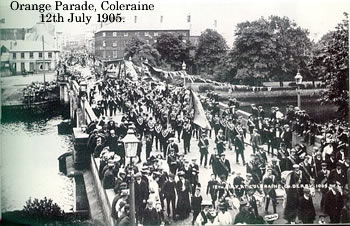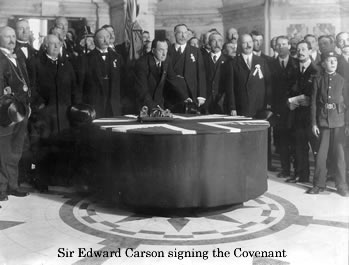The Order's Fight For The Union
1886 - 1921
|
Additional reading available from
our on-line shop is shown in yellow
|
The introduction of Gladstone's Home Rule Bill in 1886 gave
the Order a membership which was to transform it completely
to make it a highly respectable and exceedingly powerful religious
political organisation.
 The
whole influence of the Order was to be on the side of continuing
union with Great Britain on the existing pattern. The
whole influence of the Order was to be on the side of continuing
union with Great Britain on the existing pattern.
The Orange Institution had a vision and a mission.
The revitalised Orange Order sponsored meetings for all who
were against Home Rule. It arranged a meeting in the Ulster
Hall, in February, 1886, at which the main speaker was Lord
Randolph Churchill. He gave, to a wildly enthusiastic audience,
a slogan which was to be the rallying cry for the struggle
ahead, "Ulster will fight and Ulster will be right".
The first Home Rule Bill was defeated on the second reading
by 343 votes to 313, to be immediately followed by the dissolution
of Parliament.
The defeat of the Bill was received by unionists with delirious
rejoicing. Bonfires were lighted on the hills around Belfast.
There was respite for the unionists when Gladstone and his
party found themselves in Opposition to the Conservatives,
who had committed themselves to the maintainence of the Union.
The return of the Liberals in 1892 and the certainty that
Gladstone would sponsor another Home Rule Bill produced a
further alignment of unionist resources. The Orange Order
was joined with the newly-formed Unionist Clubs founded by
Lord Templetown.
When the second Home Rule Bill was defeated in 1893 the jubilation
of 1886 was repeated. On 4 April, 1893, Balfour represented
Lord Salisbury, the Prime Minister, at a four hour long march
past of loyalists in Belfast.
The Orange Order, long used to harmony in the ranks, had
any notion of perfection rudely shattered at the Twelfth demonstration,
1902, held at Castlereagh. There the County Grand Master of
Belfast, Colonel Edward Saunderson, was heckled by Bro. Thomas
Sloan, a member of the Belfast Protestant Association. The
complaint was that Saunderson, an M.P., had voted against
the inspection of Roman Catholic Convent laundries. Sloan
was in error.
Sloan was charged with unbecoming conduct and brought before
the Belfast County Lodge's disciplinary committee. On his
explusion by Grand Lodge, June, 1903, Sloan with some other
dissidents founded the Independent Orange Order.
The Independent Orange Order held its own demonstations and
at one of them in 1905 at Magheramorne, a declaration was
made to the public which roundly condemned unionism and appeared
to argue for Home Rule. The Home Rule emphasis of the Independents
owed its impetus to Robert Lindsay Crawford. In May, 1908,
Crawford was expelled and a reversion was made to the policy
which had produced the society.
In 1905 with the landslide return of the Liberals the Home
Rule controversy entered its final phase.
The Unionists and the Orangemen readied themselves for the
clash they knew to be inevitable if and when Home Rule was
forced upon them.
The Unionist and Orange programme was made clear at a meeting
in Lisburn in 1910. At this time there were three strands
of Unionism - the Ulster Unionism of Craig and the Unionist
Council; the Irish Unionists with Edward Carson; and the British
Unionsim and Bonar Law. The Irish position changed when Carson,
M.P., for Dublin University, was invited to lead Ulster Unionists
in February, 1910.
A meeting was held at "Craigavon", Craig's home,
to receive the new leader on 23 September, 1911; 100,000 attended.
The meeting marked the beginning of the campaign against the
Home Rule Bill of Asquith which was to go before Parliament
in 1912. The decision was taken to appoint a commission to
draft a constitution for the Provisional Government of Ulster
in the event of the passing of the Bill.
The great Balmoral demonstration of Easter Tuesday showed
the world where Ulster stood. The chairman was the Primate,
Archbishop Crozier, and the special speaker Bonar Law, who
declared, "Ireland is not a nation but two peoples, separated
by a deeper gulf than that dividing Ireland from Great Britain".
Carson was with him on the platform and seventy M.P.'s, English,
Scottish and Welsh, were there too with 200,000 people.

In all these events the Orange Order was inextricably
bound up. The leaders and the led were for the most part members
of the Institution. In July, 1913, 150,000 Orangemen and Loyalists
met at Craigavon. In September the Provisional Government
of Ulster was formed.
On 6 December, 1911, the Ulster Area of the Orange Institution
became a temporary Grand Lodge with Colonel R.H. Wallace as
Provincial Grand Secretary.
The third Home Rule Bill was presented to Parliament, 11
April, 1912. It was rejected by the Lords twice in 1913 but
finally got the Royal Assent to become law on 18 September,
1914. The passing of the Bill produced these poignant lines
from Sir William Watson:
"She had pleaded and prayed to be counted still,
As one of our household through good and ill;
And with scorn they replied,
Jeered on her loyalty, trod on her pride,
Spurned her, refused her,
Great hearted Ulster,
Flung her aside."
At this time a document to be described as "Ulster's
Solemn League and Covenant" was drawn up. It was largely
the work of James Craig and was based on the old Scottish
Covenant of 1580.
A united meeting of the Standing Committee of the Unionist
Council had met at Craigavon on 19 September, when the Ulster
Covenant was finally ratified. Covenant signing day was set
for 28 September, and prior to that date a series of demonstrations
were held throughout the province in which the objects of
the Covenant were explained.
On Covenant Day all commercial activities were suspended.
In the early morning churches were crowded with worshippers
invoking God to be with them in the solemn obligations they
were about to undertake. In Belfast the loyalist population
marched in formation to the City Hall, the Orange Brethren
in regalia, where they were received by the Lord Mayor and
Corporation. The corridors of the Hall, nearly half a mile
in length, enabled 600 people to sign simultaneously. They
came by 500s and passed out by the rear of the building leaving
their signatures on a roll and each person carrying his signed
covenant with him. The grand total of signatures of men and
women was 471,414.
 The
Covenant Day show of Ulster's determination took legs when
the Ulster Volunteer Force was formed under Colonel R.H. Wallace
with a strength of 110,000 men. The
Covenant Day show of Ulster's determination took legs when
the Ulster Volunteer Force was formed under Colonel R.H. Wallace
with a strength of 110,000 men.
In March, 1914, the Liberal Government decided to make an
imposing demonstration of military force to overawe and coerce
Ulster into accepting Home Rule. Whatever was the real motive
the move led to the Curragh "Mutiny", better to
be described as the Curragh Camp Incident, 20 March, when
58 out of 70 Army officers with General Hubert ough refused
to move against the North, being prepared to accept dismissal
before they would take up arms against their kin. The Ulster
Volunteer Force with Colonel Fred. Crawford as organiser,
ran guns from Germany after experiences by Crawford more exciting
than fiction. The arms were landed 24 April, 1914, at Larne,
with consignments laid off at Bangor and Donaghadee.
Though Craig, who headed the Provisional Government of Ulster,
made overtures to the British Government to stay the passing
of the Home Rule Bill in view of the imminence of war - it
broke out in August, 1914 - the Government persisted and it
became law, 18 September, 1914.
The Act was not operated because Britain had the Great War
on her hands.
In the war Ulstermen rallied to the British cause. The famous
36th Ulster Division was recruited from the U.V.F. to earn
immortal fame for its prodigious sacrifice at the Somme, 1
July, 1916. Indeed Ulstermen went into service in all the
theatres of war.
Even
before the Home Rule Bill was passed the Liberal Government
had come to realise that Ulster could not be coerced into
an Ireland ruled from Dublin.
The Government of Ireland Act, which set up two legislatures
in Ireland, one in Dublin, and the other in Belfast for the
six counties of Northern Ireland, became law in December,
1920.
From the outset of the campaign gainst Home Rule the Orange
Order had taken a responsible part. There was a high standard
of leadership utterly dedicated to the service of the Unionist
and Protestant cause. The Grand Masters had been men of consequence,
namely the Earl of Enniskillen, the Earl of Erne, Sir James
Stronge, W.H. Lyons, and Sir Edward Archdale. They presided
over brethren who responded to good leadership and who were
concerned to back that leadership against all enemies. It
is certain that without the Order the fight for the maintenance
of the Union would have been lost.
Back to History Home Page
|

 The
whole influence of the Order was to be on the side of continuing
union with Great Britain on the existing pattern.
The
whole influence of the Order was to be on the side of continuing
union with Great Britain on the existing pattern.
 The
Covenant Day show of Ulster's determination took legs when
the Ulster Volunteer Force was formed under Colonel R.H. Wallace
with a strength of 110,000 men.
The
Covenant Day show of Ulster's determination took legs when
the Ulster Volunteer Force was formed under Colonel R.H. Wallace
with a strength of 110,000 men.